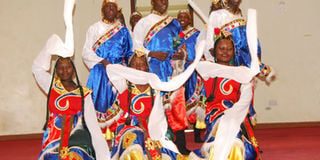Chinese is challenge to EAC on using Kiswahili

Students showcase the Chinese culture in a drama during the the launch of teaching the language at Ntare School on Saturday.
News that Ntare School has joined 30 other secondary schools across Uganda to teach Chinese is great. Quickly, since 2014, Chinese language has been approved and included in Uganda’s school curriculum and is to be examined by Uganda National Examinations Board (Uneb) in 2021. This now means the influence of China in Africa is a concrete reality.
There is no questioning of the relevance of teaching Chinese, coming when China is powerful enough and influencing events throughout the world. One, China is the fastest growing economy, surpassed Japan in 2011, and expected to outpace USA by 2020. Two, China remains a global manufacturing hub. Three, China outstrips all markets for products, including minerals, timber, and other essential raw materials.
On a positive note, just as Makerere University’s Oswald Ndoleriire rightly observed, learning Chinese gives the course’s graduates opportunities to access Chinese scholarships, business and travel opportunities, translation and business communication services, and improved relations.
But this increasing adoption of the teaching of Chinese by Ugandan schools and elsewhere in Africa also challenges Africa’s promoting of home-grown regional languages such as Kiswahili – for unity, commerce, administration, and higher education across Africa. Our regional efforts to promote Kiswahili seem outmatched by the pace enjoyed by the Chinese language.
This is despite momentous goodwill expressed in championing Kiswahili. Already, Kiswahili is the second official language of the East African Community bloc, and one of official languages adopted by the African Union in 2004, with former Mozambican president Joaquim Chissano delivering his farewell speech as AU chairman in Kiswahili in 2004.
Kiswahili is also widely spoken by more than 100 million people across East and Central Africa, including Tanzania, Kenya, Uganda, Rwanda, Burundi, Mozambique, and DR Congo, and extending further to southern Africa. Also starting in 2020, South African schools will teach Kiswahili as an optional language, the first African language outside South Africa to be offered in class.
But for more traction, it should be now that Africa’s regional organisations adopted Kiswahili as a home-grown language to champion commerce, administration, and higher education, African unity, and cultural promotion. In this regard, Egypt should be applauded for adopting three of Africa’s traditional African languages, namely Kiswahili, Hausa, and Amharic on its national information outlet, the State Information Service, SIS. This is a great move to sustain and propagate our shared African knowledge and values and wave off cultural dominance as happened under the influence of Spain, Portugal, and later England, France, Germany, and now China.
Since language and culture are fused, it should be now that calls by former Tanzania president Ali Hassan Mwinyi and youthful South African politician Julius Malema are endorsed to adopt Kiswahili as Africa’s common language.




